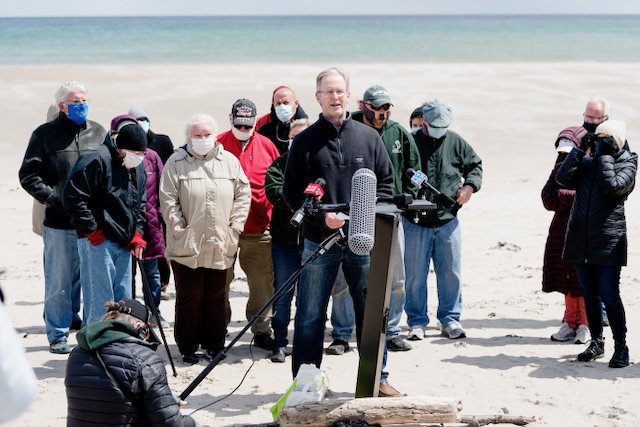Maine Beaches Case - January Update
On April 22,2021, concerned Maine residents and property owners held a press conference in Wells to announce they will prove once and for all —- in court —- that Maine’s beaches and intertidal lands belong to ALL the people of Maine.
It has been a little over 9 months since 23 individual Plaintiffs filed a case in Cumberland County Superior Court about who owns the intertidal land in Maine, the land bounded by the low-tide mark and the high-tide mark. That includes almost all of Maine’s beaches. The lawsuit argues that intertidal land is public land, held by the state of Maine in trust for all its people. This update summarizes a few hundred pages of briefs and exhibits.
As expected, the Defendants filed motions to dismiss through their various attorneys. The essence of their argument is that the Plaintiffs’ claims are based on law that was settled in Maine 400 years ago. Specifically, Defendants make two arguments. First, they claim Plaintiffs lack standing to bring a claim for declaratory judgement. To make this argument, the landowners first re-characterize this case as a quiet title action and then argue that the only person who can bring a quiet title action is the property owner. Next, the landowners claim that the principle of stare decisis (let the decision stand) compels the Court to dismiss Plaintiffs’ claims. According to this argument, the Court cannot overturn the Bell cases that were decided in the 1980’s. The Landowners argue that the Bell cases were reaffirmed by the Maine Supreme Court as late as 2019 and therefore the Court has spoken on the issue, and the Bell cases were mere extensions of cases argued and decided in Maine for 400 years.
In responses to the landowners’ standing argument, Plaintiffs reminded the Court that this is not a quiet title action. Plaintiffs are not claiming title to the intertidal land for themselves, they are claiming it for the State. Plaintiffs point out that the state of Maine is a party to this case and has argued in favor of one of Plaintiffs’ legal theories. Plus, Maine courts have long held that individual Plaintiffs may sue to vindicate public rights so long as they can demonstrate a particularized harm. In this case, each of the Plaintiffs alleged that the Defendants’ continued claims on the intertidal has either harmed their businesses, their property values, or even their right to enjoy a day at the beach.
In response to Defendants’ second argument, Plaintiffs argued that the principle of stare decisis is important, but stare decisis can never be used to justify upholding a decision most people consider wrongly decided. According to Plaintiffs, if the old Colonial Ordinance had any authority at all, it was under the common law. Common laws can be modernized by Courts and can even be changed by legislations. So, Bell was not a continuation of 400 years of legal precedent, it was a group of unelected judges standing in the way of a duly elected legislature as that legislature attempted to exercise its constitutional right to modify, modernize, or even nullify the common law. Yes, the Bell cases were discussed in the 2019 Ross case, but the issue of intertidal ownership was not before the Court in that case.
The Attorney General weighed in on this point, arguing that if the Colonial Ordinance is common law, then the Court is within their rights to expand the common law definition of “fishing fowling and navigation” to include a general recreational use of the intertidal. According to this argument, the Bell decision should be overturned to the extent that court adopted an overly rigid interpretation to those terms.
A sub-group of defendants also filed an unexpected anti-SLAPP motion. Like most states, Maine law allows a Court to dismiss a case if it appears it was brought solely to intimidate or retaliate against someone for exercising their first amendment rights to seek redress from government. These so-call SLAPP cases usually claim that the Defendant defamed the Plaintiff by saying bad things about them in the media or in front of congress, etc. This group of Defendants argued that this case was brought to punish them for speaking out against seaweed harvesting along the coast.
In response, Plaintiffs pointed out that they are not claiming defamation. Indeed, Defendants have every right to continue advocating as they please. These Defendants are not being sued because they oppose seaweed harvesting, they are being sued because they claim to own land that they do not own. In 2019, the Maine Supreme Court nullified the upland owner’s claim to Goose Rocks Beach in Kennebunk. In so doing, the Court examined the original deeds to the upland owner’s property and discovered that the intertidal (and much of the dry sand beach) was not included in their chain of titles. Relying on that 2019 case, Plaintiffs in this case provided the Court with the chains of title of each of the moving Defendants and then showed how their claims to the intertidal land next to their property were added to their titles by people who never owned it in the first place.
The motions to dismiss and the anti-SLAPP motions are fully briefed and the parties are waiting for the Superior Court to schedule oral argument.
